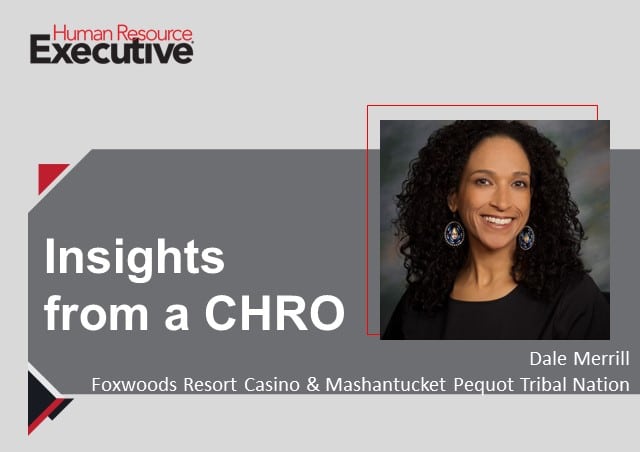Dale Merrill, senior vice president, HR and administration at Foxwoods Resort Casino, isn’t just preaching the importance of L&D—she’s living it every day.
Merrill is in the midst of pursuing her doctorate in education, with a focus on leadership and learning in organizations, from Vanderbilt University. Her studious effort comes at an important time in the industry.
As organizations seek to hold onto their talent in today’s market, many are turning to L&D to keep their employees engaged in their own growth and also to arm their organizations with the skills needed for the future. At Connecticut’s Foxwoods Resort Casino, an employer of about 3,000 people and the largest casino resort in the Northeastern U.S., Merrill is walking alongside those employees on the L&D journey.
She is juggling the expansion of her knowledge while also providing leadership for a broad portfolio at the Mashantucket Pequot Tribal Nation’s casino that includes recruiting, L&D, team member relations, and tribal and Native American affairs, among other areas.
Even though she’s been with Foxwoods and MPTN for nearly 30 years—holding leadership roles that include communications, DE&I, talent management and culture—Merrill believes furthering her education is an opportunity to push herself and give back to the organization that she says has given her so much over the last three decades.
HRE recently spoke with Merrill about her philosophy toward L&D at Foxwoods and MPTN and how HR’s strategic role has developed during her five-year tenure in her current role and over the past several decades.
HRE: You’ve been with Foxwoods for a number of years. How has the organization’s approach to HR evolved during that time?
Merrill: It’s been a bit of an iterative process in that we started—like a lot of HR divisions—in more of a support role. We were far more transactional and more about making sure we got people into the right places; and when it was time to depart the organization, we facilitated that. It was a lot of “check-the-box.” But like most forward-thinking organizations, the tribe and Foxwoods started to push and allow HR to be more than that. I’m on the senior leadership team, which I think is very reflective of the values of the organization in terms of what’s important. Their chief people officer is one of the top decision-makers. It’s gone from very transactional to putting people at the center of it all, and it’s not just symbolically. We really have a lot of input into the direction of the organization, both from the tribal side and from Foxwoods.
HRE: What have been some of the most innovative ways Foxwood has approached employee experience over the years?
Merrill: It seems pretty basic but it really is just talking to our team members—especially with the size of our organization. You usually see the things that we’re doing only done in smaller organizations, where you can really have one-on-one conversations with your team members. We have over 3,000 team members and the approach we’ve taken is to be collaborative with them at all levels of the organization. That takes the form of Team Talks, which are conversations where we are ensuring all team members are coming together, telling us what we can do to better serve our guests when it comes to Foxwoods, and what we can do to better serve our trial membership when it comes to the tribal government, which I also oversee. [We talk to them about] what we can do to create the work environment they want.
Read more Insights from a CHRO here.
A lot of people think they’re [listening to employees], but I don’t know that a lot truly are. It’s about asking the questions and then actually giving our employees what they’re looking for in that experience.
Merrill: I’m tired. And anyone else reading this, I’m sure, is tired, too. We have 61% of team members who have worked for us for more than 10 years, so a highly tenured workforce. We know that folks have choices now like never before so I think it goes back to keeping our ear to the ground and really connecting with our team members. That doesn’t mean we haven’t experienced any of those things—that would be disingenuous. But we’re focused on preparing our leaders for signs of those things and then constantly, constantly checking in with our teams about how they are feeling.
If you see something, say something; that’s where we’ve been with our leadership. If we notice somebody is somewhat checked out, we talk to them about what’s going on. Sometimes, especially now, it’s not just about the work environment not being all that someone wants it to be; there are a lot of external factors going on. So, it’s about being vigilant about offering things to support people throughout their life—talking about the whole person, not just the person you see in front of you in the workplace.
Turnover, resignations, all of that … for us, it’s been about getting ahead of it. If we know we’re really understaffed in one area, that’s the area we’re going to go to and say, “We’re not going to pretend you don’t have more work to do right now, and this feels daunting. As leadership, we know we’re asking a lot of you and if it gets too much, you need to raise your hand.” It’s things like changing hours of operation or lightening the workload—instead of just saying, “Nope, you’ve got to get it done, no matter what.”
HRE: What role does L&D play in employee retention at Foxwoods?
Merrill: It’s a two-pronged approach for us. We recognize and honor that [advancing at Foxwoods] is not going to be for everyone; for some people, work is work and they’re content where they are. One of the things that HR professionals can do is honor people who are happy in their jobs and not always push them to grow their careers but to be the best they can in that particular role. There’s this idea that, unless you’re trying to grow in your job, you’re not valued; I am going to value that person who says, “I’m committed, I love my job but I’m a person who doesn’t desire to keep going and going.” Those folks are just as valued as the people saying, “I want to learn one skill and then another and then another.”
Related: Why the L&D market is facing growing pains
And there are also the folks we know we need to continuously upskill and grow. We have an internal training and development program called the Pequot Academy, which is named after the tribe that owns and operates Foxwoods. And we’ve engaged [employees] in [building the program]. We also have a tuition reimbursement program and reevaluate that every year to see what more we can do in that space. We look for opportunities to give people strategic stretch assignments and support their learning and development around that.
HRE: And how about DE&I?
Merrill: The tribe and Foxwoods have been steadfast in their commitment to [DE&I]. If you look at our senior leadership team … our CFO is a woman, and you just don’t see leadership teams that look like we do. it’s something I’m so proud of, and I know it changes the dynamic of the workplace. I’ve worked in environments that are not as inclusive and, now working in this environment that is, there’s a stark difference in how I feel about showing up to work every day. It’s important for organizations not to focus [on DE&I] just because everyone says it’s important but to really feel that difference. Doing the real work is not easy and I think what we’ve been seeing in the last year is that folks are taking their foot off the gas in terms of inclusion and equity. I don’t know the reason but I think it’s mistaken and I’m hopeful it can get revitalized. Looking for a business case isn’t always the right thing to do; sometimes you have to look for the just case and let the results follow.
HRE: I saw that you’re in the process of pursuing your doctorate in leadership. How are you balancing that with your work?
Merrill: I made that decision coming out of the pandemic. I thought about it for many years but really believed I couldn’t make space for it, given the demands of my role. I didn’t want to put the organization in a situation where my pursuits meant I was giving less. Then, the pandemic and my ability to contribute even remotely made me realize, “OK, this is possible.” I’m very grateful the organization has been very supportive.
See also: Career mobility: the new college degree
But how am I doing it? I’m tired—don’t get me wrong—but I found a program that is flexible, so I’m not going to have to go to a campus classroom every day, so that’s helpful. It’s a lot of constant negotiation: What’s my priority at any given time, and how can I integrate work with life? There’s still this myth of work/life balance and during the pandemic everyone was pursuing that, but then I think we came to know that it’s more like work/life harmony. How do you get those two critical, important facets of your life to cooperate with one another? I’ve been able to, in between meetings, read a quick article I need to read for a literature review. And I take my classes at night, with the understanding that I might not be answering email, and that’s OK.
It was about me putting my money where my mouth is in terms of focusing on growing and continuously improving; this is me saying to my family, to the organization that I really do believe that learning and development are key to feeling satisfied in life.
HRE: Outside of work, what keeps you motivated?
Merrill: I’m very grateful to the generation behind me because I think they’ve given us this freedom to acknowledge things that maybe a couple years ago we wouldn’t have acknowledged. My initial motivation is my family but, once upon a time, saying that might have seemed anti-feminist or anti-progressive to admit that your driving force is your children. But this generation behind me is much more about freedom, about saying, “You do you; you’re doing it so there’s no wrong answer in that regard.”
I have three sons and they’re all adults now, so now it’s kind of always reevaluating what do I need to do to feel like I am giving more than I am taking in this life? In raising my kids, that’s what [my motivation] was: I felt like I was giving more by raising good humans than I was taking. Now in this chapter, I’m thinking, how can I best serve the tribe and Foxwoods and give more to the organization than I take? And that’s been this [doctorate] program. It’s been different things at different times, but that’s my North Star: finding ways to always continue to give more than I’m taking, out of this organization and out of this life.
Credit: Source link











